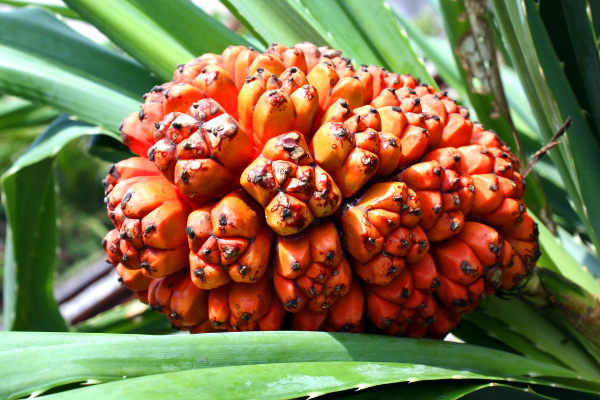Two Indian entrepreneurs in Okinawa Prefecture are developing an organic polymer made from fruit scraps that can retain water 50 times its weight, in a potential breakthrough for farming in water-scarce regions.
Polymers are usually made from chemical components and other ingredients and can absorb water about 14 times their weight.
But Puran Rajput, 26, and Narayan Gurjar, 21 — working as part of an entrepreneur support program at Okinawa Institute of Science and Technology Graduate University — say their eco-friendly alternative can take in 500 milliliters of water per 10 grams, or 50 times its weight, when mixed with soil. The polymer also works as a fertilizer since it contains nutrients from agricultural crops.
Gurjar was born in a rural part of India where farmers often experience water shortages, inspiring him to invent an eco-friendly polymer using remnants of crops that could make farming in dry areas profitable without resorting to pesticides and fertilizers.
The polymer is made mainly from pineapple crowns and the skins of shīkwāsā limes and bananas, which often go to waste when the fruits are processed.
After a substance called pectin is extracted from the skin, they are exposed to ultraviolet light to promote molecular bonding. Molecular bonding triggers a chemical reaction in the pectin, enabling it to retain water underground. The liquefied pectin is then dried and pulverized for use.
Rajput and Gurjar already set up a company in India, named EF Polymer PVT Ltd., trying out more than 600 kinds of crops. Some of their tests confirmed that the eco-friendly polymer increased yields by 20 percent while saving water and fertilizer by 30 percent and 40 percent, respectively.
The pair began their research in Okinawa Prefecture after their project was chosen last year for the graduate university’s Startup Accelerator Program, which provides funds, mentors and partnership opportunities needed to connect their ventures in Okinawa with entrepreneurs from around the world.
They have since teamed up with local farmers on experiments and analysis and received crops from companies.
After establishing a research and development company in March, they hope to commercialize their product in 2022, manufacturing the polymer both in India and Okinawa. The plan is for the Okinawa factory to ship the products domestically and to East Asian markets.
Rajput said people in both markets reacted positively when they tried the product, adding that he hopes to commercialize it by cooperating with businesses in Okinawa as well.
Source: JapanTimes
Image Courtesy: Wikimedia
You may also like
-
New Heat-Based Approach To Cancer Treatment Can Reduce Chemotherapy Doses
-
Scientists Take A Major Step Towards Unification Of Classical & Quantum Gravity
-
India Graphene Engineering and Innovation Centre (IGEIC) Under the Vision of Viksit Bharat@2047 Launched
-
New High-Performance Gas Sensor can Monitor Low Level Nitrogen Oxides Pollution
-
Antidepressant Drug can be Repurposed for Treating Breast Cancer
